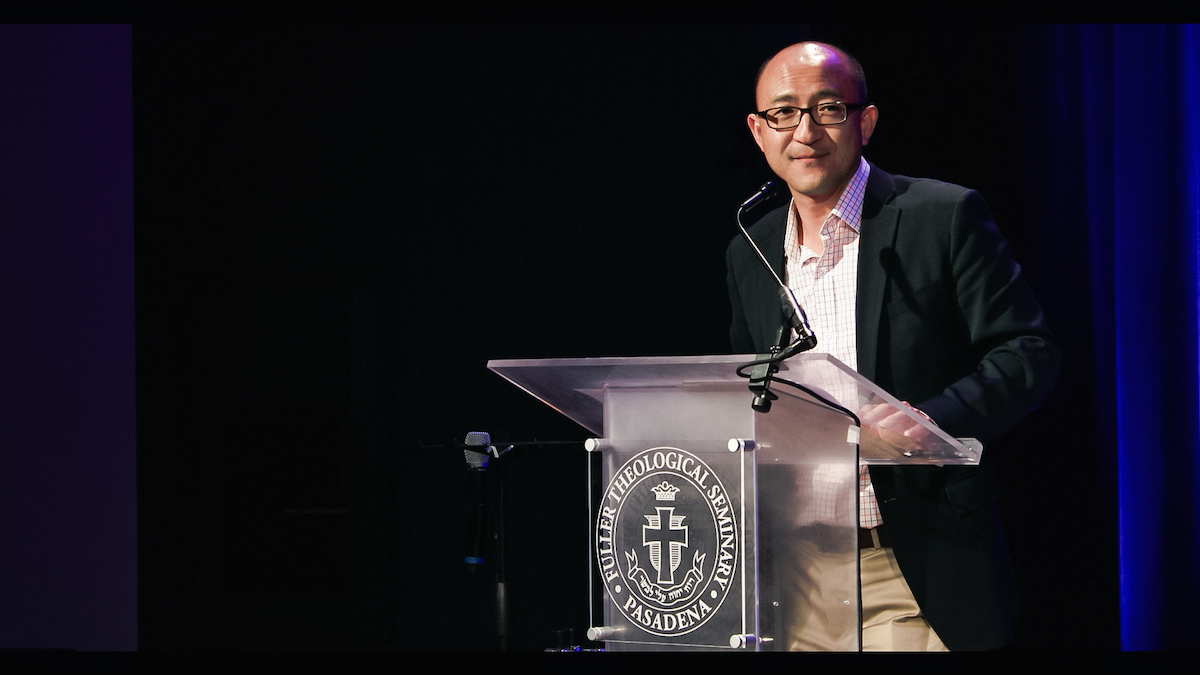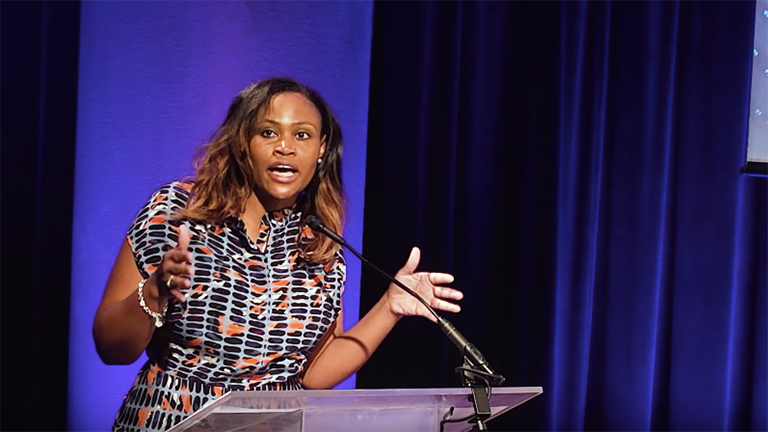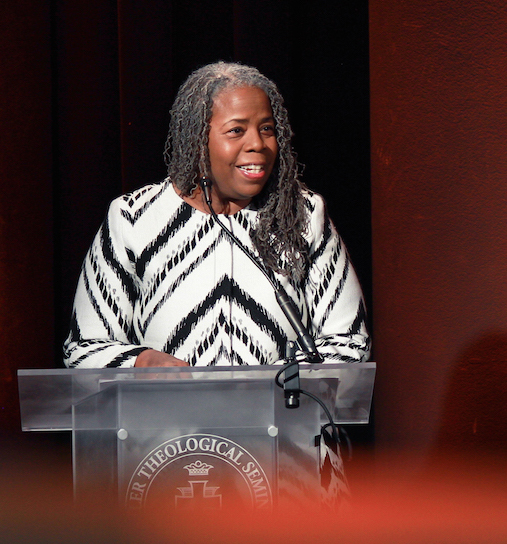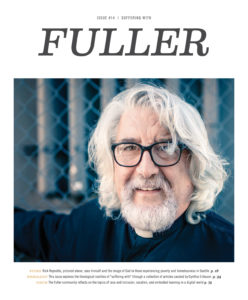
“Are you going to make space for me, too? Is your ethic and your framework going to make room for my life, too, and my thriving?”
+ Lisa Thompson, assistant professor of homiletics at Union Theological Seminary, on the power and role of proclamation, in her address at the 2018 Black Public Theology Symposium
“People have always resisted whiteness from the very beginning. People have always resisted the loss of a life in place, resisted being designated racially, resisted their lives being commodified, resisted being forced to live inside of a global system of exchange, death, and money, and resisted as long as they could the relentless systems of education and evaluation that supported these things. And they did it by drawing on the only tool they had available: their identities.”
+ Willie Jennings, Fuller trustee, and associate professor of systematic theology and Africana studies at Yale Divinity School, speaking at the 2017 Missiology Lectures on “whiteness” as a sociocultural framework
“I tell a lot of Asian American students that, even though your family might have come in the last ten years, you become a part of a larger group of people. Your history goes back 150 years in America because you become a part of this larger Asian American experience. It’s the whole Asian American racial experience. The fact that different ethnic groups come together and form the Asian American identity. I know so many Asian Americans who are relatively recent immigrants that weren’t there in the ’40s, who don’t really think about Japanese Internment as their story. They feel like, ‘that happened a long time ago, it doesn’t really matter,’ without realizing the fact that the past is always with us. It’s not something that is just in the past—it actually has an impact now and you can see the impact around you as well. I am a part of this Asian American experience that is actually 150 years long. It’s not just my family history. I’m part of this bigger story.”
+ Daniel D. Lee, assistant provost for the Center for Asian American Theology and Ministry and assistant professor of theology and Asian American ministry, reflecting on a trip with members of the Fuller community to the Japanese internment camp in Manzanar, California; pictured is a reconstruction of a guard tower that loomed over the camp.
“There were some who believed the clergy needed to be there to bring God to the Ferguson uprising, but I met Black Jesus at Ferguson. I met the dark-skinned Jewish carpenter who was birthed by a teenage, unmarried woman in the hood. And I was reintroduced to this Jesus who was constantly bringing disruptive fire to the systems and powers, using the prophetic truths of Scripture, acts of healing, and deep commitments to the poor and the marginalized. I found anew the dark body who was unfairly arrested, convicted by a kangaroo court, sentenced to die, and then executed by the empire of his day. This Jesus, the prophet, the healer, the liberator, the organizer, the exorcist of both individuals and systems, was already hanging out in Ferguson when we showed up. So it wasn’t like we was bringing Jesus, it was more like Jesus was waiting for us to get there. And it was this Jesus who I heard declare, ‘Everyone who calls on the name of the Lord shall be saved.’ This Jesus invited me to follow him.”
+ Michael McBride, lead pastor of The Way Christian Center and national director of Urban Strategies and LIVE FREE, on the Black church and resisting structures of white supremacy, at the 2018 Black Public Theology Symposium.
“Toda la teología es contextual, y nuestra comprensión de nuestro llamado estará marcada, ¡inevitablemente!, por nuestra historia, nuestro hogar, nuestra gente, nuestra cultura. Y eso es parte de la maravilla y belleza de ser el cuerpo global de Cristo, donde algunos de los puntos ciegos de una persona pueden ser detectados por otra persona porque tenemos ojos para verlos.”
“All theology is contextual, and our understanding of our calling will be, inevitably, marked by our history, our home, our people, our culture. And that is part of the wonder and beauty of being the global body of Christ, where some of a person’s blind spots can be detected by another person because we have eyes to see them.”
+ Ruth Padilla DeBorst, vice-rectora académica, Comunidad de Estudios Teológicos Interdisciplinarios, speaking at the 2018 Centro Latino Lectures on transcending divisive walls.
“How can we say that we know ourselves without understanding our context? To say that being a Christian and being Asian have nothing to do with one another goes against how we have been created in our own particular histories. You can’t escape the fact that race has been so central to our formation as a country. I think it is deeply theological. It’s historical. It’s sociological. It’s cultural—it’s all these things. It’s the water that we swim in.”
+ David K. Yoo, professor of Asian American Studies at UCLA, on race and politics, in his talk at the Public Discipleship event hosted by Fuller’s Center for Asian American Theology and Ministry

“The ability to see is connected to the ability to love. If you don’t see me, you can’t love me. If I seem to you to be something close to Chinese, even though I am Korean-American, and you only have categories for Chinese and cannot see who I am—you can’t love me either.”
+ Daniel K. Lee, assistant provost for the Center for Asian American Theology and Ministry and assistant professor of theology and Asian American ministry, on the often neglected Asian American experience, in his address at the 2017 Missiology Lectures.

“There is something with owning the deep particularities. Owning the deep particularities does not do us a disservice but actually serves a greater good. When I own a deep particularity, that’s a testing of truth against particularities. But it also requires this openness to humility. I am constantly being challenged because I am very particular in my existence. I don’t live every existence, but other people challenge me then—‘Are you going to make space for me, too? Is your ethic and your framework going to make room for my life, too, and my thriving?”
+ Lisa Thompson, assistant professor of homiletics at Union Theological Seminary, on the power and role of proclamation, in her address at the 2018 Black Public Theology Symposium
“Salvation and whiteness. These terms point to a history that we yet live within. Whiteness as a way of being in the world has been parasitically joined to a Christianity that is also a way of being in the world. It was the fusion of these two realities that gave tragic shape to Christianity in the new world at the dawn of what we now call the modern colonialist era, or as scholars like to call it, colonial modernity.
It is precisely this fusing together of Christianity with whiteness that constitutes the ground of many of our struggles today. The struggle against aggressive nationalism is the struggle against the fusion of Christianity and whiteness. The struggle against racism and white supremacy, and some aspects of sexism and patriarchy are the struggle against this fusion. The struggle against the exploitation of the planet is bound up in the struggle against this joining. So many people today see these problems of planetary exploitation, of racism, of sexism, of nationalism and so forth, but they do not see the deeper problem of this fusion. Which means they have not yet grasped the energy that drives many of our problems.”
+ Willie Jennings, Fuller trustee, and associate professor of systematic theology and Africana studies at Yale Divinity School, on uncoupling the Christian faith and “whiteness,” in his lecture at the 2017 Missiology Lectures.
“The kneel-ins during the Civil Rights Movement failed because even if you could get Black bodies inside a segregated white church, you could not force the church’s white members to treat those Blacks like Christians. Nor could you do anything to make so openly racist congregations a desirable place for Blacks or anyone committed to interracial fellowship to want to worship there.”
+ Valerie Cooper, associate professor of religion and society and Black church studies at Duke Divinity School, speaking about segregation in the American evangelical church at the 2018 Black Public Theology Symposium
“Cinco siglos de una historia cargada de cierto colonialismo y colonialidad, de proyectos de modernización, de proyectos occidentalizadores que nos tienen hoy en cierto nivel de vida donde se nos llama algunas veces a los países de Latinoamérica países en vías de desarrollo o países del tercer mundo. Entonces, esa separación, esa jerarquía nos llevan a nosotros a experimentar la vida desde un lugar muy particular. Unos le llaman el margen, otros le llaman la periferia, otros le llaman la pobreza. Yo estoy pensando de un término diferente, un término que le llamamos transoccidentalidad, que es el aceptar que somos occidentales por un lado, pero que somos no occidentales por el otro y en ese encuentro somos más que todo eso. Yo creo que el teologar así nos hace a nosotros repensar, repensar para vivir de nuevo con formas diferentes. El repensar no sólo significa revisar los procesos históricos que nos han dado a nosotros identidad, que nos han dado a nosotros una condición social. Sino que el repensar implica también el recrear.”
“Five centuries of a history loaded with coloniality, modernization projects, and Occidentalism have left Latin American countries today at a certain standard of living typically referred to with the labels of developing or ‘third-world’ countries. So, that separation, that hierarchy leads us to experience life from a particular place. Some call it the margin, others call it the periphery, and others call it poverty. I am thinking about a different term, a term that I call ‘trans-Occidentalism,’ which alludes to the fact that on the one hand we are Westerners, but on the other hand, we are non-Westerners, and both at the same time. In such a collaging encounter, we are more than any one of these two. I believe that doing theology out of this paradox makes us rethink—rethink to live again in different ways. To rethink does not only mean to review the historical processes that have given us identity and a description of our social condition, but it also implies to recreate.”
+ Oscar García-Johnson, assistant provost for the Center for the Study of Hispanic Church and Community, and associate professor of theology and Latino/a Studies, on FULLER studio.
“Theologically speaking, whiteness will not be overcome through uncritical reassertions of tradition but in learning to accept by grace a marginal seat at Christ’s table. It is only in the decentering of whiteness that white particularities will be included in the body of Christ in a redemptive manner.”
+ Andrew Draper, assistant professor of theology at Taylor University and senior pastor of Urban Light Community Church, on vulnerability and repentance, in his talk at the 2017 Missiology Lectures.
 “One of the questions we are entertaining is ‘decentering whiteness.’ I have a little challenge with that because when you say decentering whiteness, whiteness is still the target. We need to do more than that. Reconfiguration is what is needed. Voices that have not been included not only need to be heard, but inform the redesign, implementation, and leadership. We need to engage in a conversation in a safe enough way that it creates spaces for all voices to be heard. Not only with the goal of understanding, but with a commitment to change. To have those voices inform the reconfiguration. We need to create new spaces that we develop together, where no perspective or cultural value is privileged over another. Where no one position is considered superior to the other.”
“One of the questions we are entertaining is ‘decentering whiteness.’ I have a little challenge with that because when you say decentering whiteness, whiteness is still the target. We need to do more than that. Reconfiguration is what is needed. Voices that have not been included not only need to be heard, but inform the redesign, implementation, and leadership. We need to engage in a conversation in a safe enough way that it creates spaces for all voices to be heard. Not only with the goal of understanding, but with a commitment to change. To have those voices inform the reconfiguration. We need to create new spaces that we develop together, where no perspective or cultural value is privileged over another. Where no one position is considered superior to the other.”
+ Alexis Abernethy, associate provost for faculty inclusion and equity and professor of psychology, in her lecture on “Navigating (White Evangelical) Academia” at the Forum for Theological Exploration.
“My father and I were driving in his Toyota four-wheel drive up a mountain on bumpy, dirt roads, and we’d go into this small little hut. I was 10 years old, and my English was not as good as I’m speaking right now, but he sat me down and says, ‘You’re going to sit down next to this nice US American doctor who has come to help us, and you speak English. So you’re going to translate for him. We’re giving out medicine and medical help.’
He said, ‘If you don’t understand something he says, here’s a dictionary. Look it up. I’m going to come back and pick you up at the end of the day.’ Imagine a 10-year-old just sitting there. And it started nurturing this love, this empathy, this compassion that comes from the gut towards others.
If you don’t know the narrative for a young girl in Nicaragua, for a man to empower a woman, he was amplifying my voice in ways that now I’m starting to understand. He was amplifying my voice and saying, ‘You have something to contribute.’ I see that Jesus did the same thing. He amplified the voices in the margins.
Have you ever asked the question, why does Jesus ask the blind man, ‘What do you want me to do for you?’ That’s a question that has annoyed me from Jesus. I want to say, ‘Well, Jesus, he is blind. He wants to see. He wants to be healed, and he wants to see.’ But Jesus says, ‘What do you want me to do for you? Do you want me to make you well?’
That question shows that he doesn’t assume that he knows what they want. He invites the voices in the margins into a conversation; he invites them into collaboration, and he invites them to take part in their own liberation. My father did that often by disrupting the conversation and placing the odd person right in the middle of that conversation. He did it often.”
+ Inés Velásquez-McBryde, MDiv student, from FULLER studio’s Story Table on “Seeking Justice”
“I’m many things: I’m a woman of color. I’m a foreigner. I have an accent. I’m Colombian by birth. I am a naturalized US citizen. I’m a psychologist working in a marriage and family department at Fuller Theological Seminary. I’m a Christian. I’m a mother. And I mention these because I love the concept of perichoresis—the relationships between people interpenetrate. Pause for a minute to think about that. When I have all these multiple identities and I bring it and I allow you to take it from me, I expand your world thousands of times. You expand my world in ways that are incredible.”
+ Lisseth Rojas-Flores, associate professor of marriage and family therapy, on culture and privilege, in her address at the 2017 Missiology Lectures.
“If you do a study of new cultures being birthed, it’s always in mixed zones of influence. I call it a cultural estuary, where freshwater and saltwater come together to create the most beautiful, diverse ecosystem. Interdependence flows right out of the gospel. It recognized the fissure and limitation of Babel and the potential of Pentecost at the same time. You have to frame this carefully. Because if you go over too far in the direction of unity, this kind of uniformity, you lose everything. If you go too far in the direction of separate, distinct identities, or just insisting on the boundaries, not creating porousness between cultures, you lose something. You can’t create new from either place.”
+ Makoto Fujimura, director of Fuller’s Culture Care Initiative, speaking on trauma and restoration at the 2018 Missiology Lectures.
“The song that you would write is going to be very different from the song I would write. And I need to hear your laments, and I need to hear your praises. I need to hear what you’re mourning, and I need to hear what you are celebrating. And we need to exchange that with one another, not so that we can celebrate diversity for diversity’s sake, but so it can give us the tools we need to live in this perilous context.”
+ David M. Bailey, founder and executive director of Arrabon, on the church’s role in reconciliation, in his lecture at the 2019 Brehm Conference.
“Music and the arts help negotiate, construct, express the shifting in multiple identities that all of us actually have and express. And they negotiate tradition and innovation, and it’s good. They are able to choose the best elements from the local and non-local, the old and the new, fuse the sounds and create a new hybrid sound. How exciting can that be! This is the sound that I feel the church of Southeast Asia needs to hear. One that affirms their local, national identity and also their Christian belonging.”
+ Sooi Ling Tan, adjunct assistant professor at Fuller Seminary and adjunct lecturer at Malaysia Baptist Theological Seminary, speaking at the 2018 Missiology Lectures about the cultural power of the performing arts.
“I imagine that one way of working toward inclusivity follows this flow: discovering our particularities, being honest about how our distinctions became boundaries that exclude some and empower others, and then repenting by creating spaces of belonging. We don’t repent of the distinctions, the particulars themselves. Those are good things, beautiful things. Our unique histories need to be told, our cultures expressed and celebrated. We repent from giving those particulars the power to decide who matters and who does not, who deserves dignity and who can go without, who is heard and who should be silent. We repent toward a new way of being, a new space that is meant for belonging. A space where these distinctions don’t go away—they are recognized and embraced—but they are denied the power to form hierarchies and foster practices of exclusion.
I think Paul was imagining a space of belonging when he said, ‘there is neither Jew nor Gentile.’ But the process isn’t neat; for Paul, creating a space of belonging looked like writing frequently about the practice of circumcision, questioning its power to exclude Gentiles from God’s people. At Fuller, it has looked like a protest, conversations about syllabi, discussion groups, new administrative positions, and a strategic plan. I don’t expect any institution, Fuller or otherwise, to suddenly arrive at inclusivity. But there is a commitment to the process. Recently, we launched Fuller.edu/Inclusion, to illustrate this process—the strategies and efforts that aim toward greater inclusivity at Fuller. Reading about inclusion plans and strategies may feel as odd as reading about circumcision practices, but both are deeply theological. Both are grounded on the conviction that God is forming a people who belong together. The whole process—discovering particularities, naming exclusion, and imagining inclusive spaces—is the work of those who partner with God to cultivate that belonging.”
+ Aaron Dorsey (MAT ’18), Communications Inclusion Liaison at Fuller Theological Seminary

